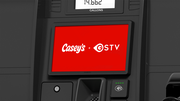Article
InfoComm13: How to avoid 'digital signage disasters'
Digital signage expert offers advice for avoiding digital signage pitfalls and disasters at this year's InfoComm.

June 13, 2013 by Christopher Hall — w, t
This year's InfoComm 2013 in Orlando, Fla., features "The Digital Signage Presentation Stage," which over the course of the show will offer attendees short educational sessions on digital signage — ranging from how to pick the right software to the uses of digital signage in restaurants.
Brian Kutchma, the vice president of sales for digital signage provider Black Box Network Services, talked yesterday about a critical subject some might prefer to gloss over in his talk, "Digital Signage Disasters, Pitfalls and Landmines, and How to Avoid Them."
Kutchma listed off some potential "worst disasters" of a poorly planned or failed digital signage deployment:
- It becomes cheap wallpaper (if an end-user skimps on costs and gets a solution that no one pays attention to).
- It becomes expensive wallpaper (if an end-user spends plenty on the front-end, but doesn't plan out the install and continued operation, and eventually no one pays attention to it).
- You end up in line (as in the unemployment line).
His best advice to avoid those disasters? Do your homework. Throughout his talk, Kutchma stressed the need to plan ahead and do proper due diligence in every aspect of a digital signage deployment.
Pitfall No. 1, he said, is the mistaken idea that digital signage is easy. (It's not. But it's worth it.)
Kutchma also went over the importance of having a digital signage team to take ownership of the project; of not forgetting the IT guy (or gal) who's vital to making it work; and to start with the end in mind and set specific, clearly defined goals.
It's also important, he said, to have real expectations of what the digital signage will do for you; to pick the right partners to implement the solution; and to wear your "customer goggles" when planning — because it's really all about them.
Don't fall victim to "the price is too good," he said, because there's usually a reason it's too good. Make sure to buy the right equipment for the job, for today and for tomorrow.
He also cautioned against picking the wrong software, or the wrong hardware, so be sure to define your hardware and software requirements ahead of time and carefully look for solutions that fit — because, he said, the devil is always in the details.
End-users should even be sure to do their due diligence on the customer service support of prospective partners or vendors. "Call them before you buy," he said. They also should be sure to check the references of partners and vendors, to find out about previous deployments they've done.
And while it's important to have a team, be careful about having too many cooks in the kitchen and "be specific about who's going to own it," he said. Also, know who going to "feed the beast," he said. "Content is the most important thing you can consider, today and tomorrow ... to avoid having it become really expensive wallpaper."
(Kutchma offered an anecdote about a digital signage end-user who'd spent significant sums of money on a great installation and on a beautiful 3.5-minute content loop ... but they only updated their content quarterly and the average time spent in the location was 5.5 minutes, so that content became, essentially, a rerun, and who watches reruns?
"Here's this multimillion dollar implementation they have, and they basically just turned it off," he said.)
You can't set it and forget it, he said, but instead you have to be sure there is a function in place to notify users of system errors and down time. "If it's off for four days it's a problem; if it's off for four minutes it's a problem."
Finally, he said, don't live with your mistakes (because there will probably be mistakes); fix them instead.
Learn more about digital signage hardware and software.









